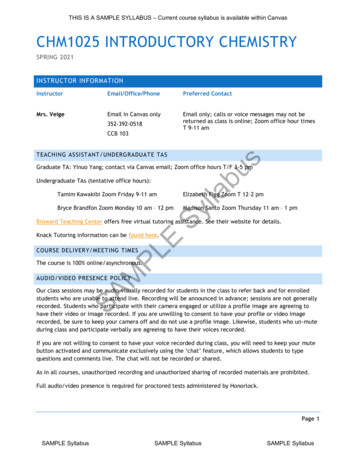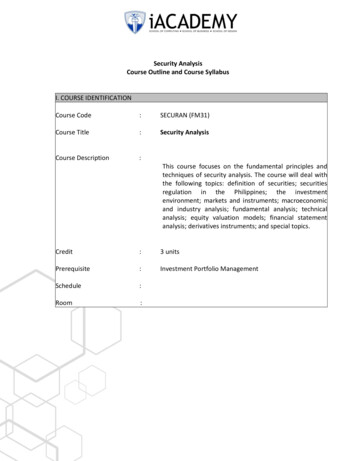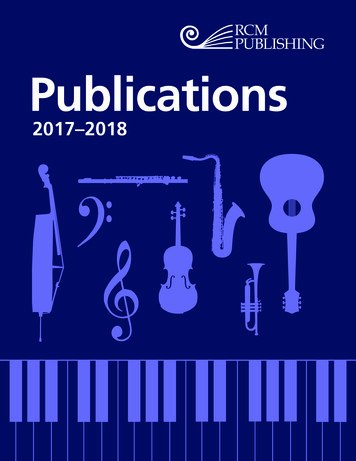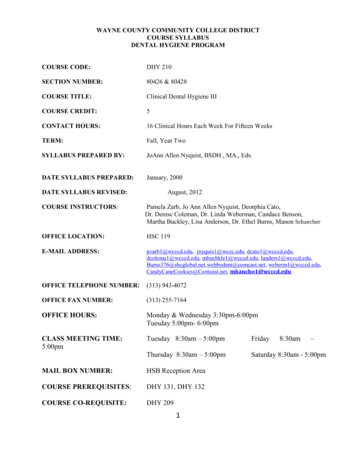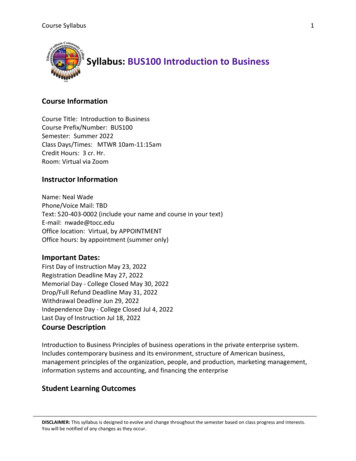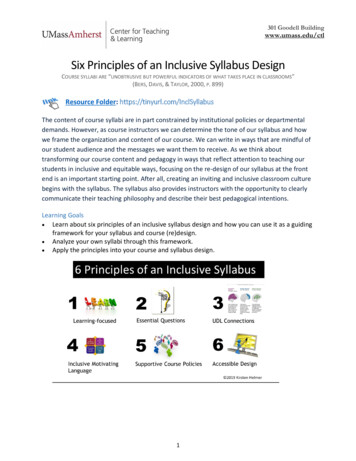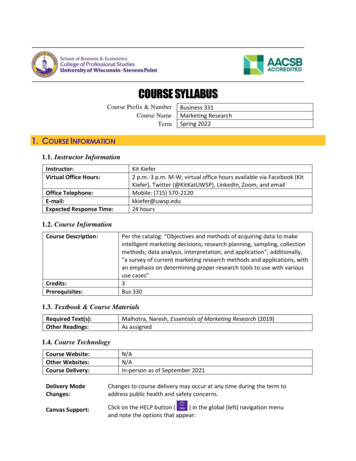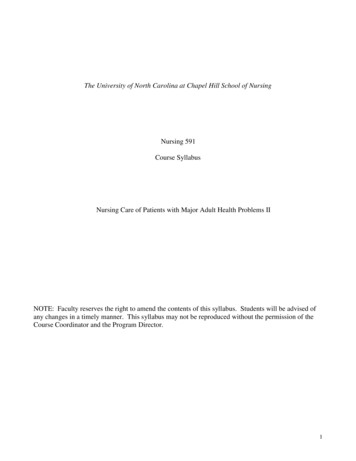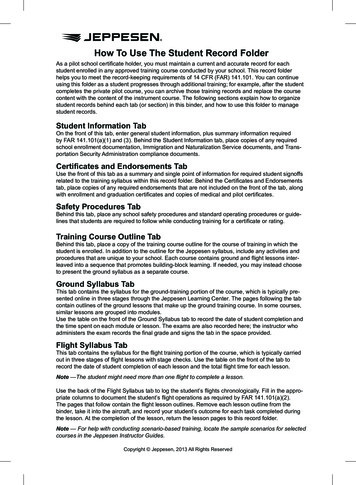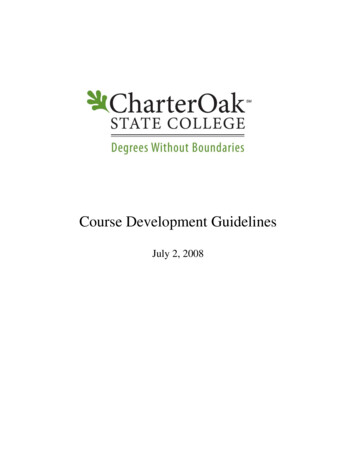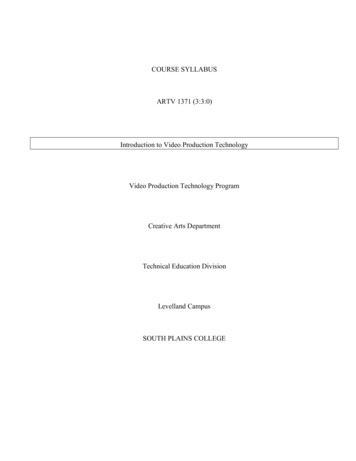
Transcription
COURSE SYLLABUSARTV 1371 (3:3:0)Introduction to Video Production TechnologyVideo Production Technology ProgramCreative Arts DepartmentTechnical Education DivisionLevelland CampusSOUTH PLAINS COLLEGE
COURSE SYLLABUSCOURSE TITLE:COURSE MEETS:ARTV 1371.001 - Introduction to Video Production TechnologyMonday/Wednesday – 9:30 to 10:45INSTRUCTOR:OFFICE :PHONE:E-MAIL:OFFICE HOURS:Andrew TaylorCA 109Work-(806) 716- 2150Home-(806) 759-6080ataylor@southplainscollege.edu(Posted at CA 109, other times by appointment)I.GENERAL COURSE INFORMATIONA. Course Description: An introduction to the equipment and concepts used in the performing artstechnology field. The student is introduced to the operation of studio and control room video,audio, lighting and staging equipment. Emphasis is placed on the production process and theproduction team.B. Course Learning Outcomes: The student will demonstrate the ability to operate major studioand control room video, audio, lighting, and staging equipment. The student will exhibit a generalknowledge of the video production process and an understanding of the role each member of theproduction team plays.C. Course Competencies: Upon successful completion of this course, each student will havedemonstrated through written examinations, daily quizzes, and individual and group projects, acompetent understanding of: The various video, audio, lighting and other systems and how they are used in theproduction process. Equipment specific knowledge of the major components of the various systemsincluding terminology, and operation of control components. Personnel used in the production process, their job responsibilities and the importance ofteamwork.D. Academic Integrity: As stated in the General Catalog - "It is the aim of the faculty of SouthPlains College to foster a spirit of complete honesty and a high standard of integrity. The attemptof any student to present as his or her own work, which he or she has not honestly performed, isregarded by the faculty and administration as a most serious offense and renders the offender liableto serious consequences, possibly suspension.Cheating: Dishonesty of any kind on examinations or written assignments, illegal possessionof examinations, the use of unauthorized notes during the examination, obtaininginformation during an examination from a textbook or from the examination paper ofanother student, assisting others to cheat, alteration of grade records, illegal entry orunauthorized presence in an office are examples of cheating.
Complete honesty is required of the student in the presentation of any and all phases ofcourse work. This applies to quizzes of whatever length as well to final examinations, todaily reports and to term papers.Plagiarism: Offering the work of another as one's own, without proper acknowledgment, isplagiarism; therefore, and student who fails to give credit for quotations or essentiallyidentical expression of material taken from books, encyclopedias, magazines and otherreference works, or from themes, reports or other writings of a fellow student, is guilty ofplagiarism.E. SCANS and Foundation Skills: This course covers SCANS:Occupational Competencies C-1, 2, 3, 4, 5, 6, 7, 8, 9, 10, 12,13,14, 15, 16, 18, 19, 20Foundation Skills F-1, 2, 3, 4, 5, 6, 7, 9, 10, 11, 13, 14, 15, 17F. Verification of Workplace Competencies: This course is the initial building block towardgraduation with a Video Production Technology degree. Information learned in this course isexpanded upon the courses that follow.II.SPECIFIC COURSE/INSTRUCTOR REQUIREMENTSA. Textbook and Other Materials: There are 10 especially prepared chapters for each areacovered in class. The text is available as a physical copy at the Book Store or will be posted onBlackboard. Ask for the ARTV 1371 "Introduction to Video Production Tech ". It is veryimportant that students have read and studied the material before it is covered in class. Bring thetext, blank paper and something to write with for taking notes and quizzes to every class meeting, asit is part of the student’s grade.B. Attendance Policy: Students are expected to attend all classes in order to be successful in acourse. The student may be administratively withdrawn from the course when absences becomeexcessive as defined in the course syllabus.When an unavoidable reason for class absence arises, such as illness, an official trip authorized bythe college or an official activity, the instructor may permit the student to make up work missed. Itis the student’s responsibility to complete work missed within a reasonable period of time asdetermined by the instructor. Students are officially enrolled in all courses for which they paytuition and fees at the time of registration. Should a student, for any reason, delay in reporting to aclass after official enrollment, absences will be attributed to the student from the first class meeting.Students who enroll in a course but have “Never Attended” by the official census date, as reportedby the faculty member, will be administratively dropped by the Office of Admissions and Records.A student who does not meet the attendance requirements of a class as stated in the course syllabusand does not officially withdraw from that course by the official census date of the semester, maybe administratively withdrawn from that course and receive a grade of “X” or “F” as determined bythe instructor. Instructors are responsible for clearly stating their administrative drop policy in thecourse syllabus, and it is the student’s responsibility to be aware of that policy.It is the student’s responsibility to verify administrative drops for excessive absences throughMySPC using his or her student online account. If it is determined that a student is awardedfinancial aid for a class or classes in which the student never attended or participated, the financialaid award will be adjusted in accordance with the classes in which the student did attend/participateand the student will owe any balance resulting from the adjustment.
The first two absences will not affect the student’s grade, but each additional absence will result in afive point reduction from the student’s final grade. If you have 6 absences, you may be droppedfrom the course. Any student not present at roll taking will be counted absent unless there was priornotification to the instructor. A student who comes into class within the first few minutes canrequest that that the absence be changed to a tardy after the class is over. Being tardy three timeswill count as one absence.Excused absence: An absence that has been discussed prior to the missed class, and arrangementshave been made to make up the work; or, a student presents documentation as explanation of theabsence. Making up an excused absence: It is at the instructor’s discretion to allow a student to doadditional work to make up an excused absence.The chairperson of the Creative Arts Department, Administration, or Counseling Department mustapprove, in writing, any deviation from the attendance policy.C. Assignment Policy: Several individual and group projects will be assigned in the semester.Students must participate in the projects during the class period in which they are done to receivecredit for them. The last project will be during the last week of class at night.D. Grading Policy/Procedure and/or methods of evaluation: There are ten areas students will beexpected to be knowledgeable in. These are covered in chapters 1 through 10. At the beginning ofeach chapter, there is a listing of specific and measurable competencies. These competencies covera set of knowledge that a prospective employer expects an employee to possess to obtain ormaintain employment. Video Production majors only must make a ‘C’ or better to advance.The competencies will be evaluated in several exams. Exams must be taken at the scheduled times.If students are unable to take the exam as scheduled, students will need to take the exam before thescheduled time or with another class. The exam cannot be taken after the scheduled time, unless thestudent has made arrangements with the instructor prior to the exam.At the beginning of each class period, a short quiz may be given. Questions will be asked overmaterial covered the previous class period or the reading assignment for that class.There are six projects in the semester. They include "hands-on" operation of the equipment studentswill have covered. Students have time to complete each project in class, except for the “Fest”productions. The two last projects consist of producing a short TV commercial, which students rotatethrough each position and participation in the “Fest” productions.Instructor evaluation of attendance, punctuality, preparedness, attitude, unannounced quizzes, andparticipation in classroom activities, discussions, and participation in productions will also beconsidered in the student’s final grade.Grade Valuesa) Exams60b) Quiz/Daily 15c) Projects20d) Evaluation 5e) TOTAL 100 %Grade Scale100 - 90 89 - 80 79 - 70 69 - 60 59 - 0 ABCD (Non Majors Only)F
E. General Control Room Information: Absolutely, NO foods or drinks will be allowed in thecontrol room at anytime without the permission of the instructor. Also, all electronic devices,including cell phones and computers will be turned off during classes and projects unless there wasprior approval by the instructor. Any student that violates the above will receive a “0” for that dayand be asked to leave with an absence.III.DIVERSITY STATEMENT: In this class, the teacher will establish and support an environmentthat values and nurtures individual and group differences and encourages engagement andinteraction. Understanding and respecting multiple experiences and perspectives will serve tochallenge and stimulate all of us to learn about others, about the larger world and about ourselves.By promoting diversity and intellectual exchange, we will not only mirror society as it is, but alsomodel society as it should and can be.IV.DISABILITIES STATEMENT: Students with disabilities, including but not limited to physical,psychiatric, or learning disabilities, who wish to request accommodations in this class should notifythe Disability Services Office early in the semester so that the appropriate arrangements may bemade. In accordance with federal law, a student requesting accommodations must provideacceptable documentation of his/her disability to the Disability Services Office. For moreinformation, call or visit the Disability Services Office at Levelland (Student Health & WellnessOffice) 806-716-2577, Reese Center (Building 8) & Lubbock Center 806-716-4675, or PlainviewCenter (Main Office) 806-716-4302 or 806-296-9611.V.NON-DISCRIMINATION STATEMENT: South Plains College does not discriminate on thebasis of race, color, national origin, sex, disability or age in its programs and activities. Thefollowing person has been designated to handle inquiries regarding the non-discriminationpolicies: Vice President for Student Affairs, South Plains College -1401 College Avenue, Box 5,Levelland, TX 79336, 806-894-9611.VI.TITLE IX PREGNANCY ACCOMMODATIONS STATEMENT: If you are pregnant, or havegiven birth within six months, Under Title IX you have a right to reasonable accommodations tohelp continue your education. To activate accommodations, you must submit a Title IX pregnancyaccommodations request, along with specific medical documentation, to the Director of Health andWellness. Once approved, notification will be sent to the student and instructors. It is the student’sresponsibility to work with the instructor to arrange accommodations. Contact Health and Wellnessfor assistance.VII. CAMPUS CONCEALED CARRY: Campus Concealed Carry - Texas Senate Bill - 11(Government Code 411.2031, et al.) authorizes the carrying of a concealed handgun in South PlainsCollege buildings only by persons who have been issued and are in possession of a Texas License toCarry a Handgun. Qualified law enforcement officers or those who are otherwise authorized tocarry a concealed handgun in the State of Texas are also permitted to do so. Pursuant to Penal Code(PC) 46.035 and South Plains College policy, license holders may not carry a concealed handgun inrestricted locations. For a list of locations, please refer to the SPC policy at:(http://www.southplainscollege.edu/human resources/policy procedure/hhc.php)Pursuant to PC 46.035, the open carrying of handguns is prohibited on all South Plains Collegecampuses. Report violations to the College Police Department at 806-716-2396 or 9-1-1.
VIII. COVID 19 STATEMENT – REV. 8/19/2021:If you are experiencing any of the following symptoms, please do not attend class and either seekmedical attention or get tested for COVID-19. Cough, shortness of breath, difficulty breathing Fever or chills Muscles or body aches Vomiting or diarrhea New loss of taste and smellPlease also notify DeEtte Edens, BSN, RN, Associate Director of Health & Wellness, atdedens@southplainscollege.edu or 806-716-2376.
SCANS COMPETENCIESTIME--Selects goal--relevant activities, ranks them, allocates time, and prepares and follows schedules.MONEY--Uses or prepares budgets, makes forecasts, keeps records, and makes adjustments to meet objectivesMATERIALS & FACILITIES-Acquires, stores, allocates, and uses materials or space efficiently.HUMAN RESOURCES--Assesses skills and distributes work accordingly, evaluates performances and providesfeedback.INFORMATION--Acquires and Uses InformationC-5Acquires and evaluates information.C-6Organizes and maintains information.C-7Interprets and communicates information.C-8Uses computers to Process information.INTERPERSONAL--Works With OthersC-9Participates as members of a team and contributes to group effort.C-10Teaches others new skills.C-11Serves clients/customers--works to satisfy customer's expectations.C-12Exercises leadership--communicates ideas to justify position, persuades and convinces others, responsibly challengesexisting procedures and policies.C-13Negotiates-Works toward agreements involving exchanges of resources resolves divergent interests.C-14Works with Diversity-Works well with men and women from diverse backgrounds.SYSTEMS--Understands Complex InterrelationshipsC-15Understands Systems--Knows how social, organizational, and technological systems work and operates effectively withthemC-16Monitors and Correct Performance-Distinguishes trends, predicts impacts on system operations, diagnoses systems'performance and corrects malfunctions.C-17Improves or Designs Systems-Suggests modifications to existing systems and develops new or alternative systems toimprove performance.TECHNOLOGY--Works with a variety of technologiesC-18Selects Technology--Chooses procedures, tools, or equipment including computers and related technologies.C-19Applies Technology to Task-Understands overall intent and proper procedures for setup and operation of equipment.C-20Maintains and Troubleshoots Equipment-Prevents, identifies, or solves problems with equipment, including computersand other technologies.C-1C-2C-3C-4FOUNDATION SKILLSBASIC SKILLS--Reads, writes, performs arithmetic and mathematical operations, listens and speaksReading--locates, understands, and interprets written information in prose and in documents such as manuals, graphs,and schedules.F-2Writing-Communicates thoughts, ideas, information and messages in writing, and creates documents such as letters,directions, manuals, reports, graphs, and flow charts.F-3Arithmetic--Performs basic computations; uses basic numerical concepts such as whole numbers, etc.F-4Mathematics--Approaches practical problems by choosing appropriately from a variety of mathematical techniques.F-5Listening--Receives, attends to, interprets, and responds to verbal messages and other cues.F-6Speaking--Organizes ideas and communicates orally.THINKING SKILLS--Thinks creatively, makes decisions, solves problems, visualizes, and knows how to learn andreasonF-7Creative Thinking--Generates new ideas.F-8Decision-Making--Specifies goals and constraints, generates alternatives, considers risks, and evaluates and choosesbest alternative.F-9Problem Solving--Recognizes problems and devises and implements plan of action.F-10Seeing Things in the Mind's Eye--Organizes and processes symbols, pictures, graphs, objects, and other information.F-11Knowing How to Learn--Uses efficient learning techniques to acquire and apply new knowledge and skills.F-12Reasoning--Discovers a rule or principle underlying the relationship between two or more objects and applies it whensolving a problem.PERSONAL QUALITIES--Displays responsibility, self-esteem, sociability, self-management, integrity and honestyF-13Responsibility--Exerts a high level of effort and preservers towards goal attainment.F-14Self-Esteem--Believes in own self-worth and maintains a positive view of self.F-15Sociability--Demonstrates understanding, friendliness, adaptability, empathy, and politeness in group settings.F-16Self-Management--Assesses self accurately, sets personal goals, monitors progress, and exhibits self-control.F-17Integrity/Honesty--Chooses ethical courses of action.F-1
COURSE OUTLINE FOR ARTV 1371 – MONDAY/WEDNESDAYDATE 2345679108ASSIGNMENTInformationProject(Labor Day Holiday)HistoryProduction Process/TeamCamerasProject #1Project #1Project #1Exam #1SwitcherProject #2Project #2DirectingExam #2GraphicsProject #3Project #5LightingExam #3Project #4Video Tape RecordingProject #1Project #1Video Editing(Thanksgiving)Project #5Project #5AudioMake-up Exam DayFinal Exam* This course outline is subject to change.
The student is introduced to the operation of studio and control room video, audio, lighting and staging equipment. Emphasis is placed on the production process and the production team. B. Course Learning Outcomes: The student will demonstrate the ability to operate major studio and control room video, audio, lighting, and staging equipment.

